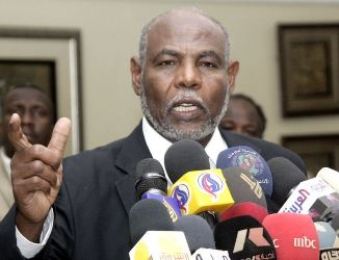South Sudan denies summoning Sudanese ambassador over border conflict
January 3, 2013 (WAU) – South Sudan on Thursday denied reports that the Ministry of Foreign Affairs and International Cooperation in Juba secretly summoned Sudanese Ambassador Mutrif Sideeg over recent border clashes.

South Sudan’s foreign minister Nhial Deng Nhial “was looking for the Sudanese ambassador, Dr.Mutrif Sideeg to find out from him why his country continues to launch ground and air attacks in areas which are deeply inside the territory of the republic of South Sudan”, a senior diplomat at the ministry of foreign affairs and International Cooperation who did not want to be named told Sudan Tribune.
“This is a clear violation of our national sovereignty which also [goes] against international law”, the foreign ministry source said.
However, the ministry’s undersecretary, Charles Mangang on Thursday said he has “no information” on summoning Khartoum’s envoy.
“I am not aware of this. I do not know anything about it,” Manyang told Sudan Tribune on Thursday without giving additional comments on the matter.
The remarks comes a week after the spokesperson of South Sudan Civil Society Alliance, Ateny Wek Ateny called on the government to summon Sudanese ambassador for attacks Juba alleges occurred on 26 and 29 December on Northern Bahr el Ghazal and Western Bahr el Ghazal, respectively.
“Our government must summon the Sudan ambassador to explain why his country has been violating South Sudan territorial integrity, or withdraw its ambassador to Khartoum. Our mission should be reduced to mere Charge de Affairs, and only 2 [of the] staff should remains in Khartoum – pending the decision to sever diplomacy in case of total war”, Ateny said in an opinion piece published The Citizen newspaper.
The activist warned that what has been going on around the frontiers of the two countries will betray the two countries’ resolve to fight a ‘clandestine war’.
“The whispering war if the two countries would like to call it may be on the verge of going out of control” he wrote, referring to the 26 December clash in Kiir Adem area, where the Sudanese Armed Forces allegedly carried out ground and air attack.
The activist claimed that Sudanese troops mounted on vehicles, infantry and cavalries, assisted by militias, armed tribesmen launched a deadly attacks on SPLA’s positions at Kiir Adem in Northern Bahr el Gazal state.
Kiir Adem is in the Mile 14 area, which, according to an agreement in September was supposed to form part of a demilitarised buffer zone between the two countries, who have failed to demarcate or resolve the status of the borders many contested areas.
Ateny said the 26 December attack was an attempt by Khartoum to capture southern territories before any potential political deal could be reached at a meeting with Sudanese President Omar al-Bashir in Addis Ababa on Friday, President Kiir said the attacks were aimed to improve Sudan’s position at the negotiating table.
He charged that the intention of the National Congress Party is to “capture” the whole of ‘Mile 14’ which is now, according to the Cooperation Agreement, stretched to cover Twic County, Warrap State in the East and Kafi-Kangi in Raja County, Western Bahr Gazal State in the West.
The Whitely-Mounro Agreement in 1924 had wanted to give the Bagara (Riziegat) access to graze at around ‘14 Miles’ South of River Kiir which lies entirely in the area of Dinka Malual. But September Cooperation Agreement extends the ‘Mile 14’ to cover Abiem, and Twic from the East, to Palueipiny and Raja in the west as a gesture of goodwill.
“It seemed such agreement had sought to barter oil with acceptance in principles that ‘we owe Khartoum some piece of land’. Unfortunately, Khartoum still wants more”.
“The emergence of a precondition from Khartoum which requires South Sudan to disarm the SPLM/A North indicates that Sudan is taking South Sudan for granted. It was not easy for any responsible government of any country in the world to have avowed into accepting in principles that it owes another country some piece of land, even by joke without such jokes turning real in the eyes of the international community. That is why Khartoum is now trying to find what is behind accepting such condition. Was it from point of weakness? I guess yes”, he explained.
Presidents Omer Hassan Al-Bashir and Salva Kiir will meet in the Ethiopian capital on Friday to discuss the issue of rebel groups which hampers the implementation of the buffer zone and also tackle the referendum of Abyei and the ownership of disputed areas on the common border.
(ST)
